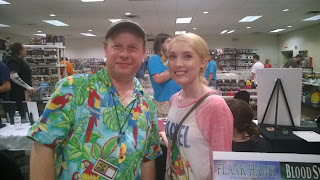It’s
often said (in some variation): An author needs to be a reader.
Most
writers are pressed for time, especially if one considers family and career
(other than authoring) responsibilities. Even writers who are full-time authors
feel there is never enough time. And every minute with a nose stuck in a book
is a minute that isn’t spent writing, editing, revising, researching,
marketing, and a myriad of other tasks essential for an author to maintain both
success and productivity.
So,
on balance, is the time spent reading worth the potential payoff?
For
me the answer to this question came into focus during an email exchange with a
former crit partner. With a husband and children, work, and moving, she had a
lot on her plate. Plus, she’s been revising and editing a handful of novels. My
former crit partner didn’t feel she had the time to read. But, during the
course of our discussion, she indicated that she’d finally sat down and began
reading Flank Hawk, and admitted it’s the first novel she’d read in almost
two years.
We
discussed use of description, including what’s ‘in favor’ on writing forums
where we’re active members. While reading my novel, she recognized that the ‘consensus’
on the forums of what works didn’t line up with the way I implemented the use
of detail within the story’s narrative. Going back and looking at her latest
revision effort, she recognized what was missing and how to make it better.
That’s
one thing reading does. It offers new ideas and methods, and reminds a writer
of what works. Thoughtful reading encourages a writer to avoid writing with
blinders on. Reading offers a bulwark against getting caught up in ‘group
think,’ at writer forums or in writing groups.
Reading
and re-reading, and studying how a successful author crafted—tells a story—helps
me immensely. When I’m unsure, trying something new, or get stuck on some
aspect of storytelling, I go back and read and study, seeing how successful
authors like Steven Brust, Roger Zelazny and Kevin Hearne (to name several of
my ‘go to’ authors) did it. Then I apply what I learned to my current work in
progress and my writing style.
For
example, that method enabled me to refine the frame story structure in Relic
Tech and create the chapter starts in Flank Hawk. The method provided
insight into the techniques to write series sequels (Blood Sword, Soul Forge, and Relic Hunted) that are
also able to stand alone. The result is that a reader can start with any novel
in my First Civilization’s Legacy Series or my Crax War Chronicles and fully enjoy that novel (story), yet those
who’ve already read a novel earlier in the series can equally enjoy all novels
in the series that follow.
Another
reason to read is to spark ideas while recharging one’s imagination. Re-reading
and thinking about Zelazny’s Guns of Avalon and Harry Turtledove’s World
War Series triggered the thought: How might a dragon fare in aerial combat
against a WW II aircraft? That occurrence of pondering resulted in Flank
Hawk, the first novel in my fantasy series.
Re-reading
One Second After by William
Forstchen and Gust Front by John
Ringo offered additional ideas, and assisted me in moving forward with my most
recent novel, Thunder Wells.
Reading
also invigorates critical observation of the storytelling process, and offers
insight and uncovers new twists that a writer might use, improving the
available array of writing and storytelling skills.
Would
anyone expect engineers that design and build cars to refrain from riding in
automobiles and note what customers who purchase such vehicles tend to enjoy?
Would it make sense for engineers to avoid immersing themselves in the driving
experience, where such activities might offer insight into what could be
implemented in their next automotive design?
Finally,
I find that reading allows me to discuss novels and authors with fellow readers
of fantasy and science fiction. This is especially useful at conventions and
book signing events. It enables me to both make a connection with potential
readers, and to determine if what I write might be of interest to them. And if
none of my works are a good match, through reading, I have a plethora of
suggestions that might be relevant to the readers’ interest.
Time
is a finite commodity. There is no
argument on that, but it’s a commodity worth spending with a good book or two…or
three.
Author Bio:
Terry
W. Ervin II is an English teacher who enjoys writing fantasy and science
fiction. Beyond his new release, Thunder
Wells, his Crax War Chronicles
(science fiction) includes Relic Tech and Relic Hunted, and his First
Civilization’s Legacy Series (fantasy) includes Flank Hawk, Blood Sword and Soul Forge. His short
story collection, Genre Shotgun,
contains all of his stories previously published in magazines, ezines and
anthologies.
When Terry isn’t writing or enjoying
time with his wife and daughters, he can be found in his basement raising
turtles.
To contact Terry, or to learn more about
his writing endeavors, visit
his website at www.ervin-author.com and
his blog, Up Around the Corner, at uparoundthecorner.blogspot.com.




No comments:
Post a Comment
Your post will be published after administrator approval.